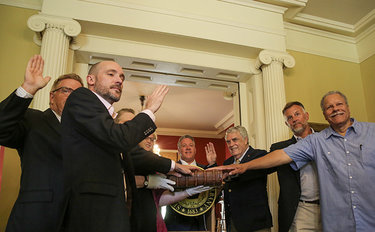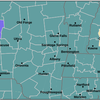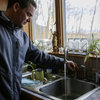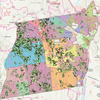‘Crossroads of the Revolution’: Albany County to focus on education, economics, diversity, unity
The Enterprise — Michael Koff
A Dutch Bible from 1741, kept at the Ten Broeck Mansion, was used by members of the newly named AlbanyNY250 Commission at a kickoff ceremony on July 10. Jeff Perlee, who chairs the committee is at far left; just left of center is the vice chairwoman, Maeve McEneny-Johnson, next to Albany County Executive Daniel McCoy, at center; Jack McEneny, the county historian, is on the other side of McCoy. At far right is Paul Stewart who, with his wife, founded the Underground Railroad Education Center. The other commission members are Brian C. Fessler, Mark Frederick Jones, Jennifer Dorsey, Joe Boehlke, and Sandy Zerrillo.
ALBANY COUNTY — Move over Boston and Philadelphia — New York state’s Hudson Valley was more significant to the American Revolution.
That was the pitch made by Jeff Perlee, the Albany County legislator who chairs a nine-member commission laying plans to celebrate the nation’s 250th anniversary in 2026.
Perlee and the other commissioners were sworn into their duties on July 10 at the Ten Broeck Mansion in Arbor Hill.
The mansion, now run by the Albany County Historical Association, was built in 1798 for Brigadier General Abraham Ten Broeck and his wife, Elizabeth Van Rensselaer Ten Broeck, the only daughter of the Rensselaerswyck patroon, General Stephen Van Rensselaer.
Kathryn Kosto, executive director of the Ten Broeck Mansion, wore white gloves as she carried a 1741 Dutch Bible, part of the museum’s collection, for the commissioners to swear by.
In front of a pillared archway the commissioners laid their bare hands on the ancient Bible and said, “I do.”
Ten Broeck, twice mayor of Albany, made a fortune clearing forests for lumber, adding to his inherited wealth and that of his wife. In 1775, Ten Broeck was colonel of the Albany County militia and in 1777, he was commander of Ten Broeck’s Brigade at the Second Battle of Saratoga.
But the 2026 celebration, Perlee promised, will be about more than battles. It is to focus on stories of the lives and experiences of those peopling the region, and the diversity of languages, religions and backgrounds that came together for a common cause.
“Crossroads of the Revolution” is the commission’s motto.
“It’s a little ironic that, when people think of the Revolution, they think of Boston and Philadelphia,” said Perlee. “The fact of the matter is, no place in the United States was more significant to the American Revolution than New York state and the Hudson Valley specifically …
“In Boston,” he went on, “most of the events were over by 1775. In Philadelphia, by 1777, the action had moved on. Here, things started in 1776 and it was a constant state of warfare until 1783. So no area suffered more. No area sacrificed more …
“Albany County was in fact the crossroads of the Revolution. It was ‘destination Albany’ when the king and his counselors sat in London figuring out how they’re going to put this whole thing down. Their focus was on Albany, New York because, if they could get to Allbany, they could sever the thing … What we know today would never have taken root.”
Perlee went on to say, “It’s not just about sort of bragging rights amongst historians or academics. It’s really about economic development as well.”
Elevating historical consciousness also elevates economic prospects, he said, stating that heritage tourism is a “huge industry,” bringing in $600 billion a year.
“That’s what’s in it for us,” Perlee said, “not just to commemorate and to celebrate and remember our own sort of glorious past, but to present it forward to the people of the entire nation and in fact the world and say, ‘Hey, Albany was where it was at. Albany is still where it’s at, where it’s at today.”
Maeve McEneny-Johnson, the commission’s vice chairwoman, echoed that theme. McEneny-Johnson, who is the director of community engagement for Discover Albany, said heritage tourists stay longer and spend more than other tourists — 38 percent more.
“And in our region, that’s not small peanuts,” she said. “That is huge.”
Discover Albany has focused on heritage tourism for years, she said. “Visitors are looking for authentic stories,” she said, describing a program Discover Albany launched during the pandemic when families “were desperate for things to do.”
An Eliza Hamilton Schuyler Scavenger Hunt was launched “and what we saw was so moving,” said McEneny-Johnson, describing the joy of children finding the “Eliza Star” hidden in the gardens of the Ten Broeck Mansion.
“What’s really magic about what we have with our heritage site is it’s going to open the door to so many stories with the Revolution and beyond,” McEneny-Johnson concluded.
For Albany County Legislator Carolyn McLaughlin, the 250th anniversary is about unity and education.
“When I look at things” she said, “I try to see the intersection across communities and this is something we can all be proud about and the opportunity to educate, educate, educate is foremost in my mind.”
The county’s executive, Daniel McCoy, who hosted the event, also spoke of the importance of education — and of diversity.
“I like to say we have a lot of proud history. We have a lot of history we’re not so proud of,” he said. “But it’s a nation made up of immigrants … We’re all immigrants that come to this country … We’ve always had a problem with immigrants …
“That’s what makes this country the greatest country in the world. It’s because we’re made up of many languages, many cultures, many foods. And that’s what I think makes us unique from around the world..”
McCoy said that, in celebrating the nation’s history, it’s important “to honor the contributions of all Americans.”
He went on, “But we need to talk about our history and [have] uncomfortable conversations of why someone owned slaves … It’s an opportunity to educate kids.”
Referencing statues being taken down or the names of buildings being changed, McCoy said, it is important to educate people about “the good, the bad, and the ugly.”
We need to educate people, he said, “so we don’t continue to make the same mistakes.”
McCoy concluded by asking for help from the public.
“There’s people out there that probably have stories, stories to tell, to share … Let this commission know,” he urged.
McCoy said he was also pleading with businesses to contribute to the commission’s work
“We need your help,” he said.



